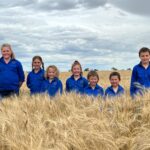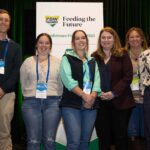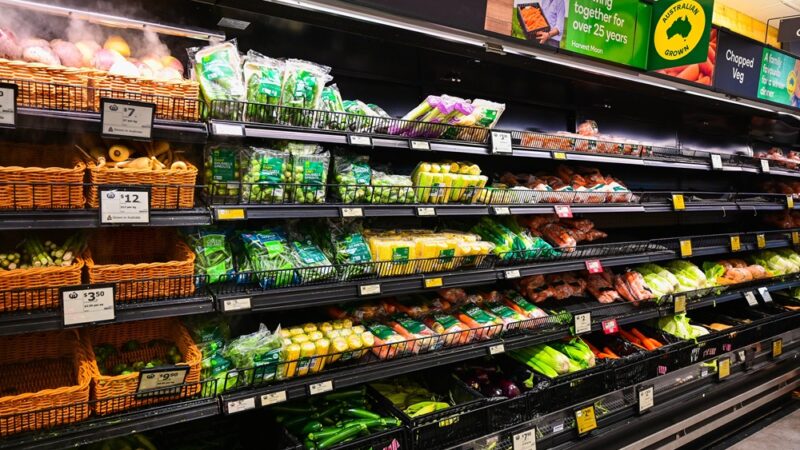The 2023 NSW Farmers Annual Conference jumped the starting gate with a special Feeding the…
The Icelandic horses of Harris Farm Markets
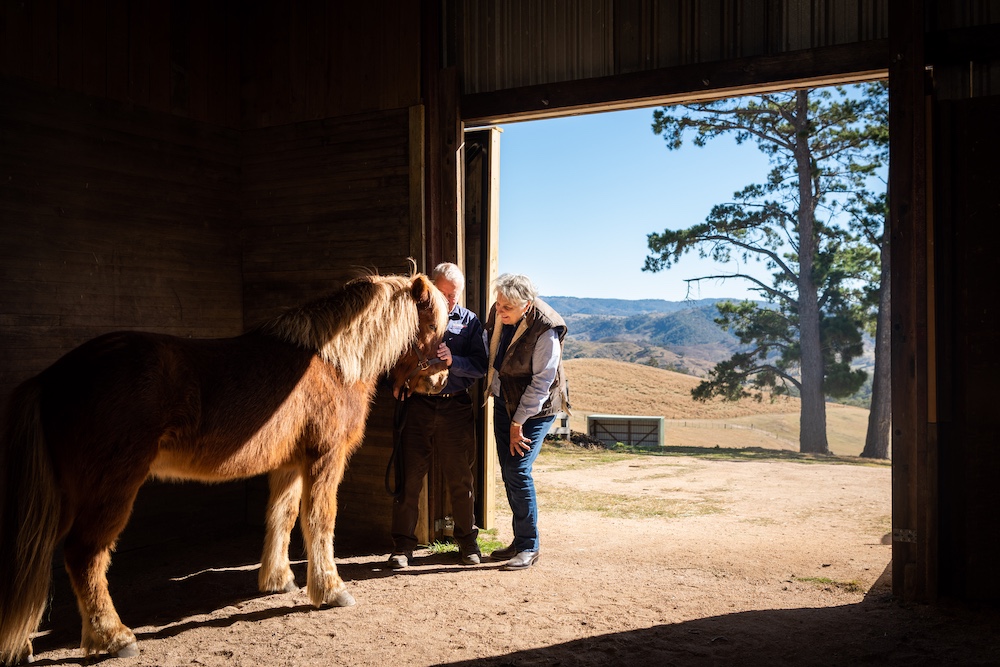
If retirement means slowing down, someone forgot to give David and Cathy Harris the memo. But this couple have always gone against the grain: from entering the fruit and veg business as young university graduates, to introducing industry-reviving innovations such as the Imperfect Picks campaign, the founders of Harris Farm Markets are trailblazers – industry leaders rather than following the pack.
Now in their sprightly 70s, and having officially handed over the reins of the business in 2013 to three of their five sons – also a business no-no, in the traditional world – the Harrises are gradually shifting focus to their own venture on the land, delving into regenerative cattle farming and breeding rare Icelandic horses on their 800-plus hectare farm (below) in the beautiful Megalong Valley of NSW’s Blue Mountains.
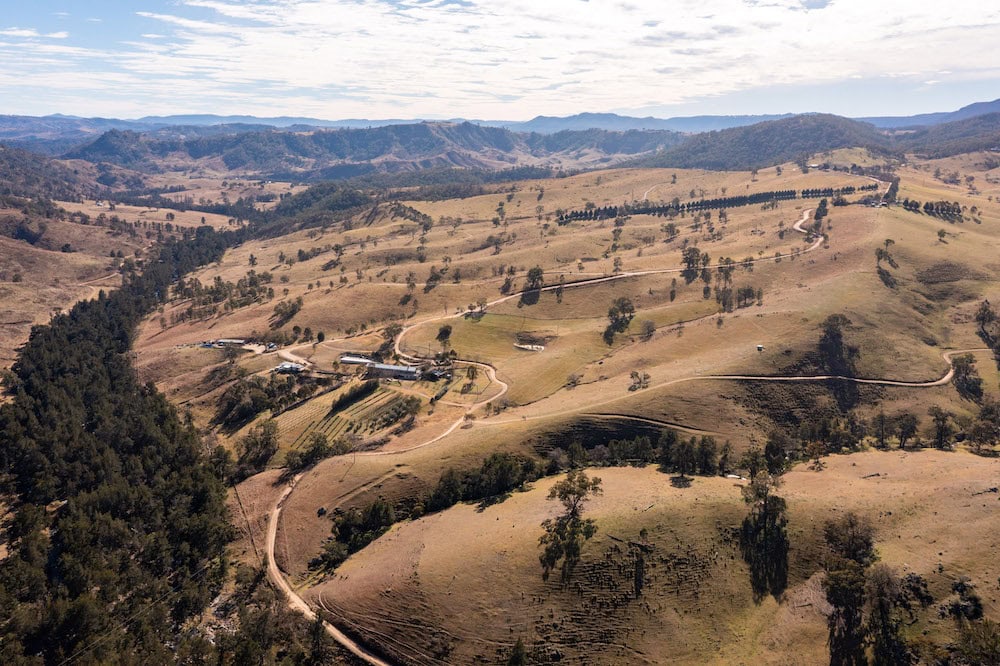
“When we were first looking for property 22 years ago, a mentor of mine said, ‘Think about what you want: do you want a project, do you want isolation, or do you want a community?’” Cathy says. “We considered it on those grounds: we didn’t want a project as we were both working too hard, and we certainly didn’t want a community. What we wanted was isolation. But guess what? In our isolation, we found both a project and a community, both of which we’ve loved and are bigger than we ever thought.”
During the pandemic, the couple built their dream home on the Megalong Valley property, a low-lying, architect-designed masterpiece that embraces nature, from its raw materials to the incredible views of undulating pastures and the meandering Coxs River from every window. And as the horse-breeding business grows, so this idyllic retreat has become David and Cathy’s primary residence, with ample room for the extended family who visit each weekend.
“We love everything about this place: we love the mountains, we love the paddocks,” David says. “It’s certainly where we spend more than half of our time. It would be a very rare weekend where we don’t have one or more of the sons and wives and grandkids here – we now have a cricket team, 11 grandkids! The horses are a big appeal, particularly for the girls.”
THE HARRIS FARM DIFFERENCE
Family has always been at the heart of Harris Farm Markets, right from its inception 52 years ago when David approached his entrepreneurial father for career advice after he and his then-fiancée Cathy graduated from a Commerce degree at university.
“He gave me some criteria to think about, and I identified two target industries: we’d either be fruit shop owners, or funeral directors,” David says. “Neither of them had big players in them at the time, so it was a logical industry to go into.”
“My father, who was Italian, was horrified!” Cathy interjects. “He was like, “I sent my daughter to the best schools, and she’s just graduated university – hello?!”
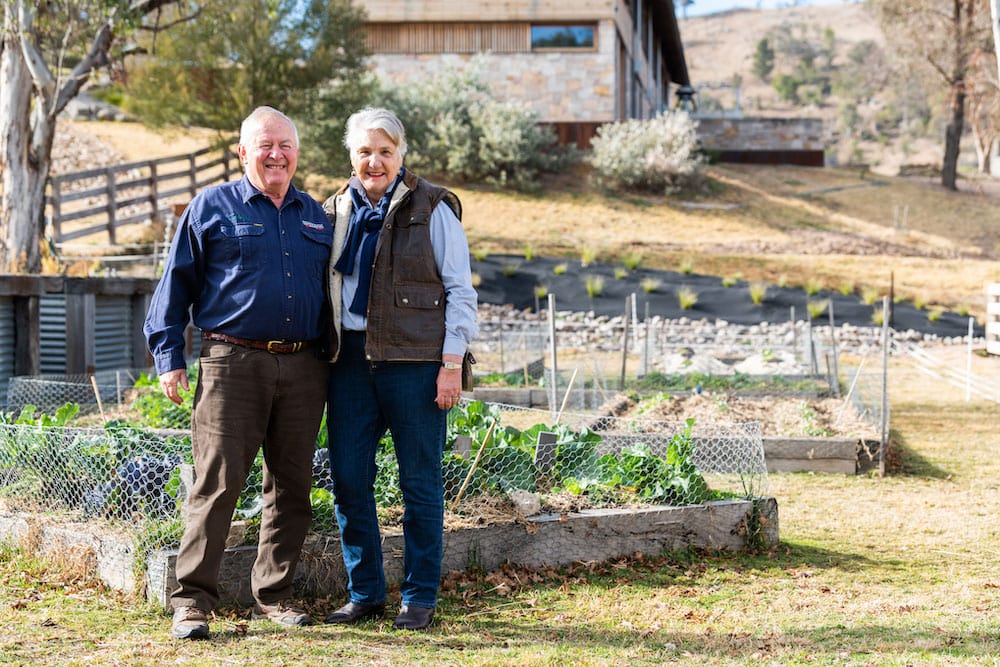
BACK TO THE LAND: Now in their sprightly 70s, David and Cathy Harris are gradually shifting focus to their own venture on the land, delving into regenerative cattle farming and breeding rare Icelandic horses on their 800-plus hectare farm in the Megalong Valley.
But fruit shop owners they became, opening their first roadside market at Villawood in 1971. And while today, Harris Farm Markets is sitting pretty with 29 stores and an enterprise value that’s more than tripled since sons Tristan, Angus and Luke became joint CEOs, the road to success has had more than its share of potholes.
In 1990, as interest rates spiked and Paul Keating’s infamous ‘banana republic’ speech resounded around the world, so Harris Farm Markets – which had rapidly expanded to 37 stores in the mid-‘80s – faced bankruptcy, forcing the Harrises to strip the company back to bare bones. With great tenacity and wiser decisions, however, they managed to rebuild the business, rebuying stores and establishing partnerships with growers, a business model that sets the company apart from its much larger competitors.
“We were always very connected to the farming community,” David explains. “Right through the ’70s, we were living in Dural, and we market gardened the whole 25 acres – we had share farmers living on the farm with us, so we really understood how it works.
“We see ourselves as partners with the growers, as we’ll take the whole crop, regardless of size or imperfections. You do the job for us, and we’ll do the job for you. The ideal for us is to work with medium-sized farmers: generally we’ll take 60 to 70 per cent of their fruit, but they have other customers as well, which keeps them in touch. That way they’ll know we are being genuine.”
Introduced in 2014, Harris Farm’s ‘Imperfect Picks’ was a ground-breaking initiative, beloved not only by savvy consumers, but also by the farmers who operate under the vagaries of nature. Last year, for instance, torrential rain all but ruined NSW’s blueberry crops. Rather than throw the damaged fruit away, however, Harris Farm Markets sold them at a heavily discounted price, marketing the berries as suitable for jam.
While other smaller companies have a similar business model, it’s Harris Farm’s reach to different demographics that have made this campaign such a godsend for farmers.
“Most shops can’t take all the sizes [of fruits], but we can because we have stores in Bathurst and Rose Bay. They’re not the same markets. Everyone wants something that eats well and keeps well. If it looks good as well, that’s a bonus – but we’ve educated our customers to actually look beyond that with these imperfect picks. A bit of a scar on the skin of a mango isn’t anything. There’s lots of people who recognise that’s value.”
SUSTAINABILITY MANIFESTO
Meanwhile, Harris Farm Markets’ commitment to sustainability and giving back to the farmers that supply their stock has resulted in their latest innovation – transforming shop food waste into compost, thereby adding nutrients to the soil and improving the farmers’ yield. This allows the growers to supply Harris Farm Markets with higher quality, higher yield crops – a win-win for everyone, resulting in a healthier farming future.
Soil health and being part of the climate solution is an integral part of how David Harris manages his own farm, following regenerative practices that work with nature rather than against it. The Harrises even scatter their own paddocks with peels left over from orange juice production in their stores, with the cattle devouring the fermenting peels (“citrus-infused beef!” Cathy enthuses) as well as improving the soil quality.
As well as running around 500 head of cattle following ‘regen’ principals of stock rotation, the Harrises also grow organic berries – which are added to Harris Farm Markets’ yoghurt – and lavender, which they bunch and sell in the shops. They also have a substantial rosemary crop, which is donated to Legacy for use on Anzac Day.
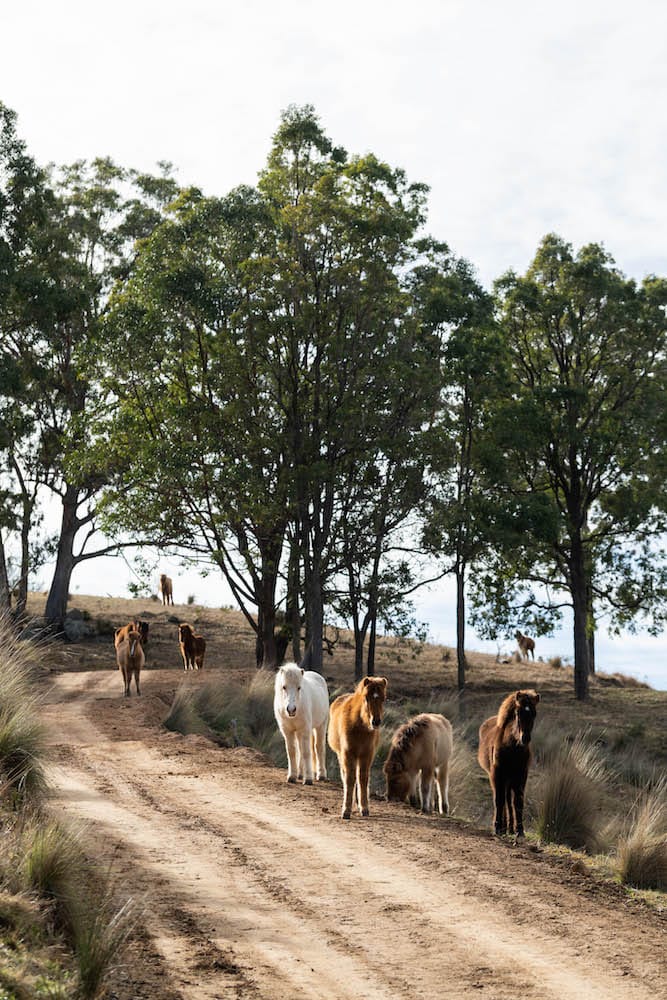
THE PORSCHE OF HORSES
But it’s the horse-breeding business which excites both David and Cathy the most – an unlikely venture, considering David only took up horse riding at the tender age of 55.
“When it came to handing over the business to my sons, Cathy asked me what was I going to do,” David explains. “Every year I’d been going on a grand riding adventure in the world, one of which was to Iceland. And I said, ‘You know, I loved riding those Icelandic horses – I reckon we could breed them.’ And we did.”
With shaggy coats, voluminous manes and a cute demeanour, the small but sturdy Icelandic horse (“don’t call them ponies!” Cathy insists) is one of the oldest pure breeds in the world. Icelandic law prevents any other horses from being imported into the country, and no exported horse can return, meaning that the breed has retained its genetic integrity since they were first introduced by the Vikings in the 10th Century.
“There’s a few things about Icelandics,” David says, when explaining his interest in the breed. “They have quite different natures to other horses. They are friendly – if we walk into the paddock, they’ll all come down the hill to see what’s happening. And the fact that they aren’t so high means Cathy and I can get on and off a bit easier! But the most important thing is they have this unusual gait, the tölt.”
While most horses move in four paces – walk, trot, canter and gallop – some breeds possess a fifth gait, a four-beat lateral pace that lies somewhere between a trot and a canter. In Iceland, this is called the tölt – a pace so smooth, the horse is known as ‘the Porsche of horses’.
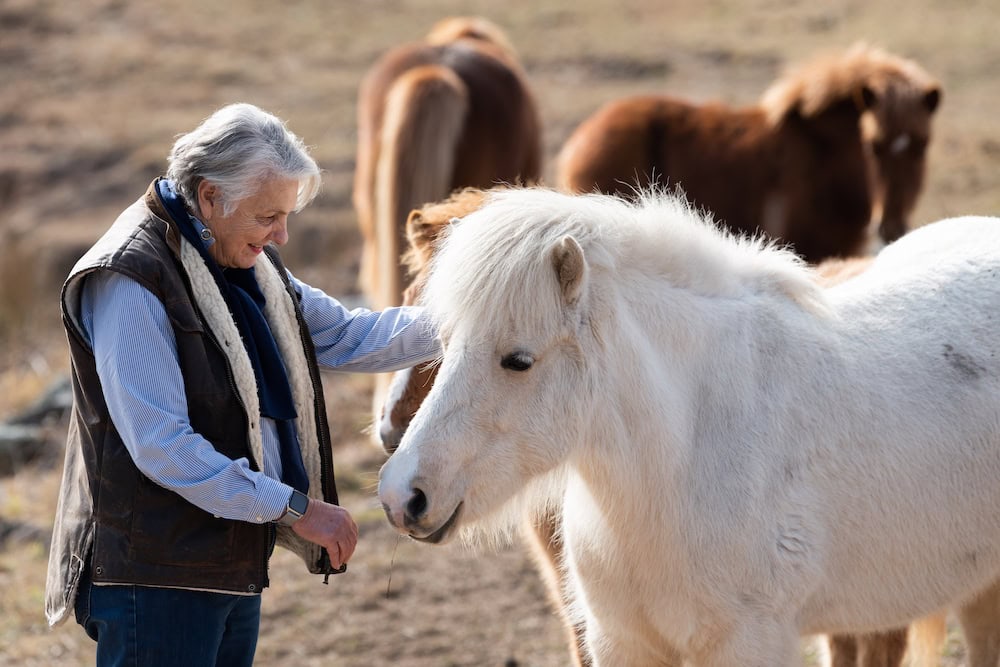
To find good breeding stock, David employed an Icelandic horse breeding judge who took him around Iceland to find quality riding horses to start his own herd. He returned with a stallion and eight brood mares, some of which were in foal; and after 10 years of breeding and purchasing other mares from a stud in Victoria, they now have 120 horses, from newborn foals to riding horses ready for sale.
Despite Australia’s climate being vastly different to Iceland’s, the imported horses have adapted well to life under the Australian sun, and have proven to be low-maintenance animals. But with Icelandic horses traditionally not broken in or bred until they are at least five years old, getting a horse ready for sale is a slow, laborious process, one brought to fruition by a team of Scandinavian women who break in the horses and train them on the Harris’ Megalong Valley farm.
“While there are other breeders in Australia, they haven’t got the people to train them. We have a house on the property where four young European women live – they’ve grown up on horse farms in Iceland or Denmark, and they know the breed and can develop the special gait the way it should be developed.
So we’ve got the finished product available, and can offer people nearly bullet-proof horses. We try to match the horse and rider, and sell them something they can actually ride and enjoy.”
The Harrises are now considered the premier breeders of Icelandics in the Southern Hemisphere, with David a representative of both the Icelandic Horse Association of Australia and FEIF, the International Federation of Icelandic Horse Associations.
“It’s highly regulated: every foal that’s born here has to be DNA tested and registered. We know there’s about 650,000 in the world, and about 250,000 of them are in Iceland. The country only has 350,000 people, so nearly everyone has a horse!”
WILDLIFE CORRIDOR
As their knowledge about regenerative farming increases, and in an effort to retain a low carbon footprint in keeping with Harris Farm Markets’ ‘back to nature’ philosophy, the Harrises have learned to not only appreciate the wildlife that shares their farm environment, but to revegetate their land to be conducive to endangered species such as platypus and koalas.
“The idea is to create a pathway between the Kanangra-Boyd National Park and the Blue Mountains so wildlife can flourish,” David says. “We’re working with a number of like-minded people with acreage that is contiguous; and we’ve had the Science for Wildlife people out here to give advice on what trees to plant. It’s not only good for the land and the wildlife, but there’s potential for tourism – a more sustainable, upmarket tourism than what the Mountains is traditionally known for. More back to nature.
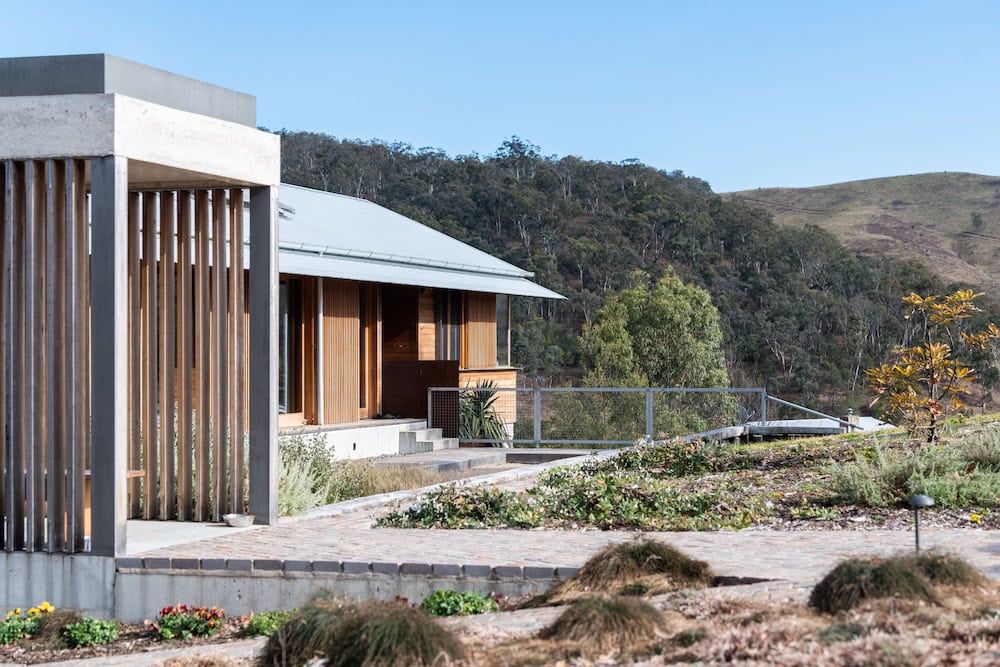
“We try and make the farm sustainable in three ways: we’ve got the cattle, we’ve got the horses, and we’ve also got a little tourism venture. We have an eco-lodge and some little cottages on the property that we’ve done up, and we let them out on Airbnb. It brings in income and we employ eight people – it’s not about making money, it’s about being financially sustainable.”
Regardless of these long-term projects based out of their Megalong Valley farm, both David and Cathy remain an integral part of Harris Farm Markets: Cathy is Chairperson of the Board and involved in the marketing side of the business, while David retains an active role in Operations, working closely with both growers and the team in the markets.
“I don’t interfere with the way the boys run the business,” David says, “but I do interfere with what figs or raspberries are in the shop. The buying team in the markets know I’ll be ringing them as late as midnight – and I’m on the computer from 5am until around 11am, keeping tabs.”
“The boys are doing such a fabulous job – they are absolutely the bosses, but David is still god in the markets,” agrees Cathy. “I keep joking that I’m the chairperson of the board, but I can’t tell the difference between a Navel and a Valencia, whereas David will pick up an orange and go, ‘That’s from Mildura, it was picked on such and such road on the left side of the hill… and they picked it three days too early.”



